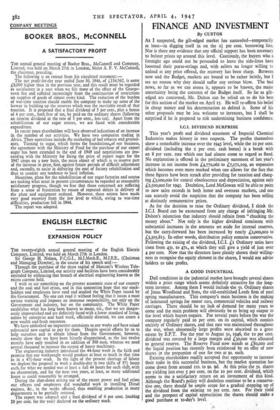FINANCE AND INVESTMENT
By CUSTOS
As I suspected, the gilt-edged market has succeeded—temporarily at least—in digging itself in on the 21 per cent. borrowing line. Nor is there any evidence that any official support has been necessary to bolster prices up around this level. Cautiously, the buyers who a fortnight ago could not be persuaded to leave the side-lines have loosened their purse-strings and, with sellers no longer willing to unload at any price offered, the recovery has been sharp. Between now and the Budget, markets are bound to be rather brittle, but I see no reason why they should suffer any serious blow. The bad news, so far as we can assess it, appears to be known, the major uncertainty being the contents of the Budget itself. So far as gilt- edged are concerned, Mr. Dalton can be relied on to do his best for this section of the market on April 15. He will re-affirm his belief in cheap money and his determination to defend it. Some of his other proposals may be less welcome to investors, but I shall be surprised if he is prepared to risk undermining business confidence.
I.C.I. DIVIDEND SURPRISE
This year's profit and dividend statement of Imperial Chemical Industries makes history in two respects. The profits themselves show a remarkable increase over the 1945 level, while the ro per cent. dividend (including the 2 per cent. cash bonus) is a break with an 8 per cent, rate which one had almost come to regard as fixed. No explanation is offered in the preliminary statement of last year's increase in net income from £4,770,062 to £7,171,109, an expansion which becomes even more marked when one allows for the fact that these figures have been struck after providing for taxation and charg- ing L3,0130,000 for central obsolescence and depreciation, against only £2,500,000 for 1945. Doubtless, Lord McGowan will be able to point to new sales records in both home and overseas markets, t.nd one can scarcely avoid the suspicion that the company has been selling at distinctly remunerative prices.
As for the decision to raise the Ordinary dividend, I think the I.C.I. Board can be exonerated from any charge of infringing Mr. Dalton's injunction that industry should refrain from "chucking the money about." Not only is the higher dividend consistent with substantial increases in the amounts set aside for internal reserves, but the carry-forward has been increased by nearly L2,000,000 to £1305,815. In other words, distribution policy remains conservative. 'Following the raising of the dividend, I.C.I. Li Ordinary units have risen from 43s. to 47s., at which they still give a yield of just over 4 per cent. Now that the directors have plainly shown their willing- ness to recognise the equity element in the shares, I would not advise holders to take profits.
A GOOD INDUSTRIAL Dull conditions in the industrial market have brought several shares within a price range which seems definitely attractive for the long- term investor. Among them I would include the 5s. Ordinary shares of Jonas Woodhead and Sons, the old-established Leeds firm of steel spring manufacturers. This company's main business is the making of laminated springs for motor cars, commercial vehicles and railway carriages. There should be no lack of demand for many years to come and the main problem will obviously be to bring up output to the level which buyers require. For several years before the war the company regularly paid 10 per cent, on its capital, which consists entirely of Ordinary shares, and that rate was maintained throughout the war, when abnormally large profits were absorbed to a great extent by E.P.T. For the year to August 31, 1946, the io per cent. dividend was covered by a large margin and £30,000 was allocated to general reserve. The Reserve Fund now stands at £80,00o and the liquid position has recently been reinforced by an offer of new shares in the proportion of one for two at 9s. each. Existing shareholders readily accepted that opportunity to increase their stake in this successful business, but the market quotation has come down from around ris. to 9s. 9d. At this price the 5s. shares are yielding just over 5 per cent, on the ro per cent, dividend, which seems to me a satisfactory return on an investment of this kind. Although the Board's policy will doubtless continue to be a conserva- tive one, there should be ample scope for a gradual stepping up of the dividend from the existing to per cent. rate. For their yield and the prospect of capital appreciation the shares should make a good purchase at to-day's level.


































 Previous page
Previous page